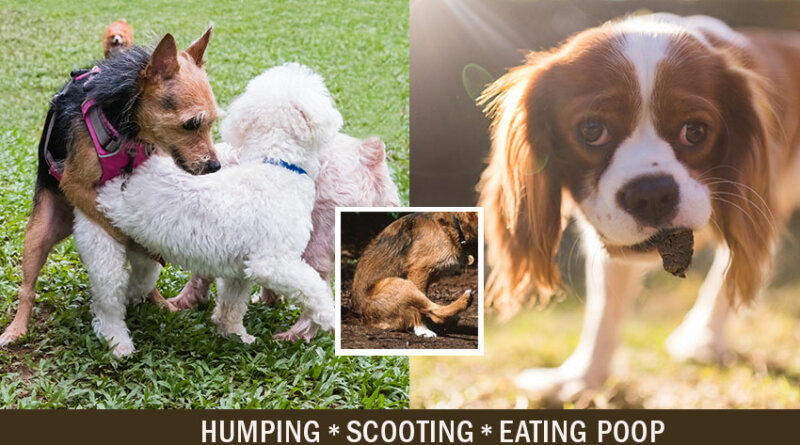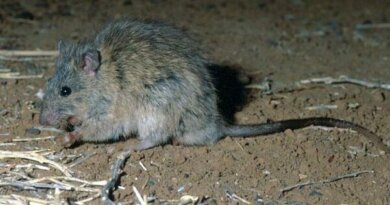Humping, Scooting And Eating Poop – Why Are Dogs So Weird!
Dogs perform many behaviours that we and our friends think are adorable. They also perform some quite unsavoury ones, with many of us trying to stop them in their tracks. However as off-putting as it might be, our dogs are usually just carrying out very instinctive animal behaviours. Dogs are dogs at the end of the day. They have gelled well with human domestic life, but they are still animals. Understanding why they carry out particular behaviours will make it easier to know what is normal and what is not. It is also important to know when leaving them to get on with it is the best policy.
As a behaviourist and dog trainer, I am constantly asked: “Is what my dog doing normal?”. And, in most cases, it is. It is just not something that people are familiar or even comfortable with. The key is to understand the root cause of the behaviour and then address that (if it needs to be addressed). I’ll be honest here, some behaviours you will just have to let happen. It could mean a much happier dog in the long run.
Three behaviours commonly come up when talking with dog owners. Humping, scooting and eating poop! These are hot topics because many people find them either embarrassing or disgusting, especially when performed in public. I have seen the mortified look on an owner’s face as their dog humps away at my leg on many occasions. Understandably, these emotions drive a desire to change their dog’s behaviour but first let’s take a look at what drives the behaviour itself.
Why Is My Dog Humping Everything?
Humping for dogs is very normal and is not always related to sexual frustration or a high sex drive—a common go-to explanation for most people.
GET THE BARK IN YOUR INBOX!
Sign up for our newsletter and stay in the know.
Humping During Play
Some dogs exhibit humping when in play. It may make us feel uncomfortable, but this is sometimes just another form of play and not something to worry about. It does not mean they are being sexually aroused or domineering. I have often seen side humping occurring between dogs and even head humping. If another dog is uncomfortable with it, they will let the humper know.
However, if your dog is especially targeting another and not listening to that dog’s communication to back off, you may need to intervene. When you see your dog’s humping movements are becoming harder and they are pursuing the other dog with pin-pointed focus, this is a different situation and you should recall your dog to prevent distress or harm to the other dog. It has moved from play to pursuit and excitement levels need to be reduced.
Humping When Stressed
Humping feels good and can be a very intuitive way to relieve stress. Dogs become stressed for many different reasons and are masters of disguising their feelings to appease their owners. They then use humping as a stress release outlet for all that pent-up emotion.
With stress-related humping, what started as a quick stress release (and could have been a one-off) can quickly escalate to a more serious problem. If the underlying reason for the stress is not resolved, the dog humps more often to relieve stress but quickly becomes almost addicted to the feelings of pleasure that humping brings them. Even if the initial stress-related issue is resolved, a dog may continue to hump.
Humping Compulsively
Dogs who have obsessive-compulsive disorder will often turn to humping if their OCD habit is interrupted or prevented. A dog who compulsively licks the carpet may turn to humping the pillow (or the next visitor) if the owner stops them from licking the carpet. A dog with OCD that turns to humping should not be stopped from acting it out. It could cause severe distress.
I have seen humping used as an alternative to an unwanted OCD habit of licking. The dog, in this case, created sores and friction burns by compulsively licking himself. With the help of a dog trainer, the owner trained their dog to hump a “personal” pillow in the room next door. The key is to work out why your dog is humping and whether it is connected to stress. Then you can decide how you should proceed.
Sexual Behaviour Humping
Humping is not always related to sexual urges but of course, it is one of the reasons for humping and masturbating. Male dogs that have the scent of a bitch in heat but are not able to pursue them typically mount and hump to release sexual frustration building up. This can occur in both intact and neutered males.
Females also mount, hump and masturbate, especially when they are in season as they too have sexual urges that are not being met.
Sexually charged humping can sometimes be coupled with behaviours that are typically associated with trying to attract a mate, or “flirting.” Play-bowing, pushing up against the object, tail high, whining.
Rule Out Medical Reasons
As always, my first advice if a dog’s behaviour takes a sudden change is to visit a vet and have them medically examined. Illness can cause your dog to seem odd. Humping could also be a symptom of something beyond instinctive behaviour being played out. It could be the result of a medical condition and worth visiting the vet. You may find that homoeopathic or prescribed medication is necessary to treat your dog.
Why Does My Dog Rub His Bum Along the Ground?
Commonly known as scooting, seeing a dog drag himself across the ground bum first can be quite a comical sight when outside. But on the carpet, it is a different matter. And what if that carpet is at your in-law’s house?
What causes your dog to drag their bum across the ground? Are they just trying to satisfy an itch? There are a handful of reasons that make this act quite normal behaviour for your dog. Knowing these can then lead an owner to take appropriate action to address a more serious problem or treat it as a one-off and hope they don’t do it at an inappropriate time or place.
What Are The Causes Of Scooting
Dogs perform this behaviour in almost all cases because something is irritating their anus. The causes range from something as simple as an itch to more serious issues such as worms, wounds or tumours. It is well worth taking note of how often your dog does this as a trip to the vet may be necessary to address a medical issue.
If you suspect that there is something more to your dog’s scooting than an itch or an attempt to clean more thoroughly after a bout of diarrhoea, you can check your dog’s bum before going to the veterinary clinic. Use gloves and lift your dog’s tail. The anus should be clean and free from any smells. If your dog regularly collects small amounts of faeces when they poop, you should clean the area when returning from walks. It is important to remove the waste, preventing bacteria from going back into the anal passage and infections from occurring.
Irritated Anal Sacs
One common cause of continuous scooting is a problem with your dog’s anal sacs. These are located just inside the rectum and are what our dogs are sniffing at when they greet each other. If you can smell a foul odour coming from this region, this generally indicates that they are infected or impacted in some way and you should visit your vet.
Some dogs need to have their anal sacs drained regularly. These glands secrete a liquid that has unique scent characters that identify one dog from another, as well as other information. If these glands get blocked, the secretion is unable to be expressed. Once squeezed, the impact on your dog’s scooting is immediate.
Worms, Parasites Or Infections
When inspecting at home, if you see tiny white specs that resemble grains of rice it is likely your dog has tapeworm. Tapeworm causes a lot of irritation and discomfort for your dog.
Unlike worms, you might not be able to see a possible parasite or infection. If your dog is dragging their bum along the ground more than once or twice a week and this is accompanied with licking, biting and generally seeming agitated, you should visit the vet. Dogs do not perform these behaviours ‘just because’ or in response to stress or overexcitement. It will be because something is irritating them.
Why Does My Dog Eat Poop
Some dogs eat poop. Not all of them but you may have a stool-eater in the family and find it really gross. Dogs who eat poop are not oddballs. In fact, quite a lot opt for this culinary choice. Some dogs find and eat other dog’s poop, some will eat their own and some will eat the poop of other species.
If your dog is into eating poop, it is a hard trait to train out. Now, whilst this is revolting to us, it is a normal behaviour for not just dogs, but much of the animal kingdom.
Thankfully, neither of my Greyhounds have shown any interest in eating poop whatsoever. But when one of them stayed with my in-laws, their Bichon Frisé started following him out to the garden in hopes of another dinner.
Extra Nutrients, More Food
There is a valid reason behind this unsavoury meal. When a dog has a well-balanced and rich diet, their digestion does not break down all the food completely. This leaves nutritious crumbs in their poop and other dogs are then attracted to the possibility of a good meal and will tuck right in without hesitation. It is a chance to get more nutrients into their bodies and is quite instinctual. Hound breeds with the super-sensitive noses are the most likely to exhibit this behaviour. A dog has 300 million scent receptors compared to our measly 6 million and the scent hound is the most skilled at using them.
Charlie, my in-laws Bichon had recently been placed on a restricted diet due to a diabetes diagnosis and was seeking his “junk food” elsewhere. He was quite possibly hungry as well, as the diet was to reduce his weight. Dogs can go to incredible lengths to feed themselves. They are scavengers of rubbish bins, days-old discarded food, dead animals, and in Charlie’s cash—poop!
Training Advice To Stop Poop Eating
So, what are you supposed to do to stop your dog eating faeces when you are out?
It’s a tricky one and not something that has a definitive answer but here are some suggestions that have yielded results in the past.
- Changing your dog’s diet to include more nutrientrich foods could have the desired outcome. It has worked in some cases but in others, it did not change the dog’s behaviour towards eating poop.
- Train your dog to “leave it” and reward them heavily when they do not eat the poop. Use a treatbased reward that you know your dog loves. You want your dog to decide that what you have to offer is better than what the poop has to offer. I recommend that once you find this treat, use it only for preventing poop eating to make it a high-valued item.
- Visit the vet to rule out any medical issues. There could be an underlying issue that is causing your dog to seek food or nutrients elsewhere. Harmful tissue inside the body could be absorbing all goodness from food creating a need for more.
If you are concerned about your dog’s behaviour for any reason, not just the three in this article please speak to a behaviourist, trainer or visit a vet. They are all working in the best interests of your dogs and asking, “Is what my dog doing normal?” can never be a stupid question.





abella danger filmleri https://abelladanger.online/ abella danger izle